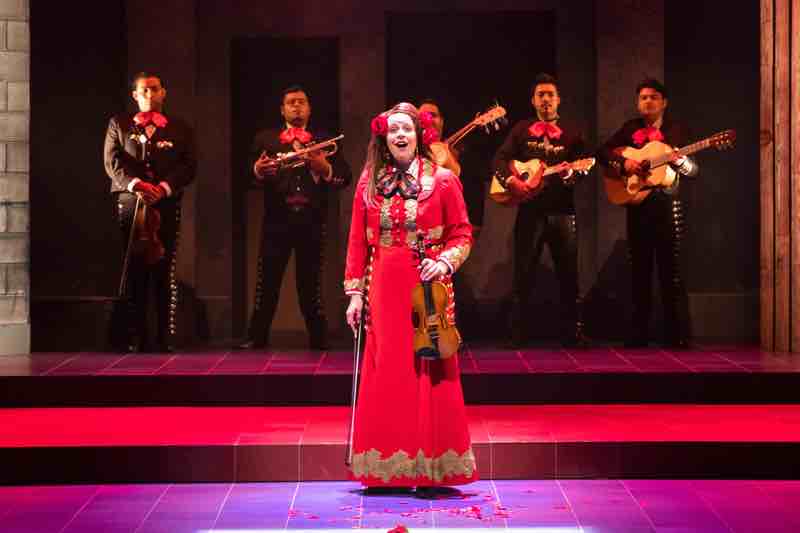
Through October 9
Cheers to the Cleveland Play House for beginning the 2022-2023 season with the upbeat (literally) American Mariachi. Excellent music played by excellent musicians (and not-so-excellent-but-on-purpose) actors brought smiles all around.
Director Henry Godinez places original musical arrangements by Cynthia Reifler Flores (who also serves as music director) front and center in this play by José Cruz González about the power of music (what else?) to unify and heal. In this case, the music is Mexican mariachi as played by a small, but striking ensemble that appears and disappears as the story continues.
Set in the 1970s in an unspecified U.S. city, the story touches on social conflict about proper gender roles. Lucha (a charming and sympathetic Elizabeth Romero) cares for her ill mother Amalia (a quiet Gigi Cervantes). Her father, Federico (an overbearing Ricardo Gutierrez), is wedded to the gig life as a musician and refuses to care for his ailing wife, a task he leaves to his daughter. Lucha’s cousin Hortensia or Boli (a wonderful Lucy Godinez) often helps.
When Lucha’s mother hears a tune on an old record the cousins play, she briefly wakes from her progressive slide into dementia. Alas, Lucha’s father breaks the old record in a fit of anger, so Lucha and Boli begin a quest to find another copy. When they learn there was only one copy, Lucha and Boli decide to form a mariachi band to recreate the song. This is radical since mariachi was a man’s game.
Along the way they recruit (by scouting local church choirs) three women to join them: Soyla (a sassy Gloria Vivica Benavides), Gabby (Amanda Raquel Martinez), and Isabel (Molly Hernández). Lucha’s godfather, Mino (Bobby Plasencia), agrees to help them get started. Mino discovers the women can sing (and surprisingly well) but have little or no experience playing the instruments he assigns them. (Never mind. Where there’s a will, there’s a way, right? Especially in a play with music.)
A spirit whose “yell” opens the show, Tia Carmen, is played by Eréndira Izguerra. Adding an element of magical realism, her ghostly (and brightly) costumed Tia Carmen drifts in and out of the action. (BTW, Izguerra actually did form a women’s mariachi group in Chicago.)
Set designer Linda Buchanan uses a couch and chair on a raised platform to suggest a modest home. Lighting designer María-Cristina Fusté enhances the scene at special times with strings of lights that descend like stars from the sky above the actors. Ray Nardelli coordinates the vocals and sounds as music spills from walls and windows.
And yet . . .
Author González brings multiple plot points before us in the hour and a half plus production. There’s a lot of music, plus information about and evidence of music’s power to unite, to cheer, to heal, and to comfort. All valid ideas, each deserving of its own show. Blending them all together, however, weakens the overall effect — whipsawed as we are from feeling deeply touched by the daughter’s efforts to use music as therapy to soothe her mother’s dementia and then excited to see the entrepreneurship Lucha and Boli display as they decide to organize their own band. and then to our delight at their success as even her father sees how good her ensemble has become.
And yet . . .
Amalia, the mother whose ailment started this all, never seems fully developed. After sitting around most of the time, showing in all too-short scenes how the mariachi that filled her youth brings her joy, she just walks off and appears later as a ghostly figure now united with her dead loved ones.
Perhaps turning these important story elements into separate dramas would allow fuller development instead of suggesting the author had a check list of social and personal elements that needed to be added to make the play work. It’s either too long or too short. (Yes, I know it’s easier to sit back and criticize than to do the work, but these stories have such strong and unique insights, it’s hard not to see how close they are to being even better.)
Bottom Line: Overall, it was inspiring to see this well-acted and upbeat story filled with fiery Mexican mariachi tunes bring the Cleveland Play House to life after the Covid interval.
[Written by Laura Kennelly]